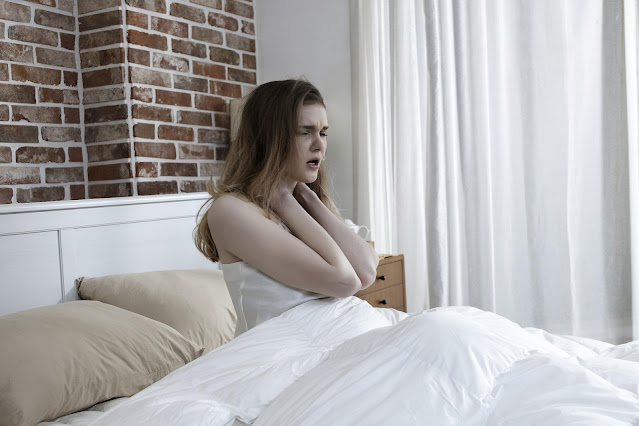10 tips for treating insomnia | Managing insomnia at Home | Fit Archive
10 tips for treating insomnia | Managing insomnia at Home | Fit Archive
Insomnia is a sleep disorder that causes trouble going and/or staying asleep. It may also appear and disappear. Acute insomnia can extend from one night to several weeks. Chronic insomnia occurs when it occurs at least three nights per week for three months or longer. Insomniacs have difficulty sleeping despite ample sleep chances, and they also have excessive daytime sleepiness and other dysfunctions when they are awake. According to numerous research and surveys, sleep experts currently estimate that 10% to 30% of adults2 suffer from some sort of insomnia.
 |
10 tips for treating insomnia |
Insomnia Causes
The following are the most typical causes:
⦁ Anxiety, stress, or depression
⦁ noise
⦁ a room that is either too hot or too cold
⦁ uncomfortably firm beds
⦁ Cocaine and ecstasy are examples of recreational drugs.
⦁ jet lag
⦁ work in shifts
⦁ uncomfortably firm beds
⦁ nicotine, caffeine, or alcohol
How to Diagnose Insomnia
Insomnia is defined as difficulties initiating or maintaining sleep, waking up earlier than intended, and resistance to going to bed at a decent hour. These symptoms must persist for at least four months despite appropriate nightly sleep opportunities. Before beginning insomnia treatment, you should consult with your doctor or another qualified physician to discuss your symptoms and obtain a diagnosis.
Some symptoms of insomnia are listed below,
⦁ Hyperactivity, impulsive behavior, hostility, or other behavioral issues, Errors, and accidents are more likely.
⦁ insufficient motivation or energy
⦁ Malaise or fatigue
⦁ Memory, focus, or attention problems have a negative impact on social, family, occupational, or academic success.
⦁ Irritability or irritability Excessive daytime drowsiness
How much sleep do you need?
On ordinary:
⦁ Adults require 7 to 9 hours of sleep
⦁ children require 9 to 13 hours of sleep
⦁ while toddlers and newborns require 12 to 17 hours of sleep.
What happens to your brain while you sleep?
A Boston University research reveals a process connected to the brain's electrical activity during deep sleep in which neurons switch on and off in slow waves. When the cells are silent, blood travels in rhythmic pulsating waves through the brain, followed by cerebrospinal fluid. This novel mechanism removes cellular waste from brain activity, including toxins linked to neurodegenerative illnesses like Alzheimer's.
Treating Insomnia
Many people can get back to sleep by changing their sleep patterns and resolving any factors that may be causing their insomnia, such as anxiety, medical ailments, or drugs. If these approaches do not improve relaxation and sleep, your doctor may offer behavioral therapy, drugs, or both. Insomnia is frequently curable regardless of age. Changes in your routine during the day and before you go to bed are frequently the key. These ideas may be helpful.
- Caffeine and alcohol should be avoided or limited, and nicotine should be avoided. All of these things can make it difficult to sleep, and the effects can continue for several hours.
- Don't put up with suffering. If you have a painful condition, talk to your doctor about pain medicines that are effective enough to control pain while you sleep.
- Large meals and alcohol should be avoided before going to bed. A light snack is acceptable and may help prevent heartburn. Drink fewer fluids before bedtime to reduce the frequency with which you must urinate.
- Maintain a consistent sleep routine. Maintain a consistent bedtime and waking time from day to day, including on weekends.
- Continue to be active. Regular physical activity promotes a restful night's sleep. Exercise should be done at least a few hours before bedtime, and stimulating activities should be avoided.
- Examine your meds. If you take medications on a regular basis, consult your doctor to see if they are contributing to your sleeplessness. Check the labels of over-the-cou
- Naps should be avoided or limited. Naps can make it difficult to sleep at night. nter products to see if they include caffeine or other stimulants like pseudoephedrine.If you really must have a nap, try to keep it to no more than 30 minutes and avoid napping after 3 p.m.
Some Pro Tips for Treating Insomnia
⦁ Make your bedroom Sleep-Friendly
⦁ Look for methods to rest
⦁ When you are not sleeping, get out of bed
⦁ Avoid attempting to sleep too hard
⦁ Keep your home environment clean
Consult with your Doctor and Therapist
Consult with the doctor for New treatments, interventions, and tests are being tested as a means of preventing, detecting, treating, or managing this illness.
We hope that this article helps you to understand insomnia and we have briefly explained the causes of insomnia and treatment. Insomnia may disrupt your lifestyle so treating insomnia maybe looks weird because treatment of insomnia can change your lifestyle but after treating insomnia you can live your life healthy and happy.






No comments